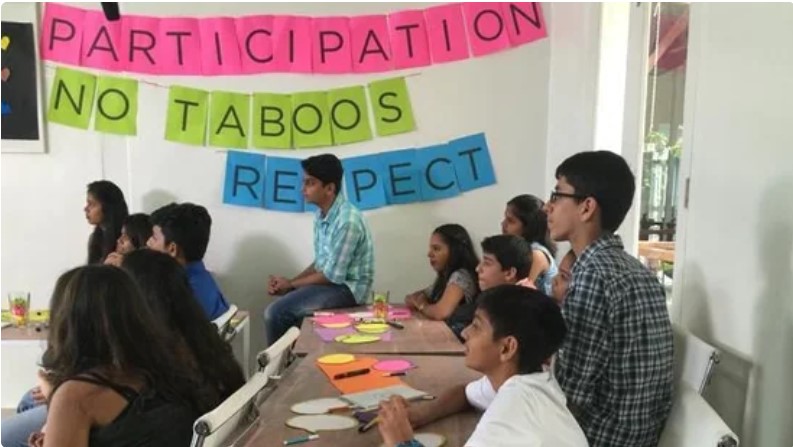Adolescence is the stage of transition and transformation from childhood to adulthood. A phase of exploration, curiosity, and confusion about one’s body and mind. Ever-inquisitive teenagers constantly find themselves wondering – ‘What is happening to my body?’, ‘Why am I going through this change?’, ‘Why do I feel attracted towards that person?’, ‘Whenever I have my periods, why am I not allowed to go to the temple?’.
The word ‘sex’ is a major taboo in Indian households – only discussed in hushed tones and euphemisms. Our society associates a number of negative connotations with the idea of sex, and sexual & reproductive health – things one must never speak of with a child, especially teenagers.
Unfortunately, this leads to the overlooking of critical issues stemming from our collective ignorance, including inadequate menstrual and reproductive health awareness, harassment, abuse, and enduring trauma.
The silence, which begins at home, school, community, or society adds to this confusion. Parents believe that children are too young for this ‘talk’ and they will eventually know what they need to ‘at the right age’. In schools, teachers lack proper training on how to address these questions and thus end up skimming through biology chapters dealing with adolescence. The community and society stigmatise young people who speak up and seek information to make sense of the changes they face. Given the silence, where do they get answers to their endless list of questions? They turn to their peers or the internet to sate their curiosity. Said peers are equally confused and the internet does not provide accurate and age-appropriate stigma-free information which further leads to misleading notions around ideas of sex and sexuality. This culminates in a larger and adverse impact on the mental and thereby physical health of young people. Therefore, there is an urgent need to bridge this information gap.
Comprehensive Sexuality Education (CSE): More than ‘Sex-Ed’
Comprehensive Sexuality Education addresses all these long detailed questions in a safe and non-judgmental space providing young people with the necessary knowledge, abilities, attitudes, and values to approach the topic of sex and sexuality. Sexuality is not the same as sex, it is much more than that. It covers gender identities, the gender roles one plays, how one experiences touch, love, and intimacy, as well as how they display attraction. The foundation of CSE hence lies in empowerment via informed decision-making.
UNESCO, under the Revised Edition of the International Technical Guidance on Sexuality Education (2018), defines CSE as “a curriculum-based approach of teaching and learning about the cognitive, emotional, physical and social aspects of sexuality. It aims to equip children and young people with knowledge, skills, attitudes, and values that will empower them to: realise their health, well-being and dignity; develop respectful social and sexual relationships; consider how their choices affect their own well-being and that of others; and, understand and ensure protection of their rights throughout their lives”
CSE as the Need of the Hour: Facts & Figures
India bears a disproportionate share of the worldwide burden of unwanted pregnancies, particularly among teens. According to the National Family Health Survey (NFHS-4), roughly 7.9% of women aged 15 to 19 had already started having children (Table 4.11). In spite of efforts to combat the practice of child marriage, 27% of Indian women aged 20-24 were married before the age of 18. CSE’s ability to delay sexual debut and promote healthy relationships makes it an effective tool in the fight against teen pregnancy and early marriage.
On another concerning note, the rate of Sexually Transmitted Infections (STIs) in India is alarming. According to the National AIDS Control Organization (NACO, 2021), about 2.4 million persons in India are infected with HIV. By providing young people with the information and resources they need to make educated decisions about their reproductive health, safe sex practices, such as the use of condoms and regular testing, CSE has the potential to drastically bring down instances of teenage pregnancies and the spread of STIs.
Gender-based violence is still a major concern in India, with reports of sexual assault against women on the rise. As per the NCRB’s ‘Crime in India 2021’ report, there was a 19.34% increase in rape cases from 2020 to 2021. These numbers, including other sexual violence incidents, are often a result of the lack of proper sex education and gender sensitization. CSE, by including modules on relationships & boundaries, offers an effective technique for combating harmful gender norms and encouraging respectful, consenting partnerships.
For the LGBTQIA+ youth in India, CSE can be a beacon of inclusivity and acceptance. While the Supreme Court’s historic decision decriminalising homosexuality in 2018 marked a significant milestone, challenges persist. CSE creates an environment where queer individuals get the space to be understood, supported, and celebrated.
Case for CSE in Indian Schools
India is home to 253 million adolescents; young people in the age group of 10-19 years who comprise 21% of the country’s population (Census, 2011). Adolescence is a crucial stage in development. Hence, it is important that the right form of intervention is taken at this phase when an individual assumes a sense of self-identity and is marked by a myriad of emotions including enthusiasm, idealism, self-doubt, and anxiety. Young people’s schooling has a significant impact on whether stereotypes are reinforced or contested. Since it is easier to access adolescents enrolled in school and incorporate crucial life skills in their curricula, school-based interventions are both practical and economical. An important aspect of schools is their social position and acceptance as educational institutions among family, community, and society. In schools, students not only acquire knowledge but also imbibe values, and develop an understanding of social norms that finally influence their behaviours.
The aim of CSE is therefore not only to reduce potentially negative consequences of sexual behaviour like unwanted pregnancies, STIs, and child sexual abuse, but also increase the well-being of an individual by enhancing the quality of life and relationships of young people. It develops a sense of agency and autonomy among young people in a country as culturally varied as India, where traditions and conventions differ greatly. CSE empowers adolescents with the right kind of information and builds the capacity to make personal decisions, understand and identify the options and act in a responsible way.
In a rapidly changing world, CSE is not just a necessity, but a moral imperative. CSE has the potential to empower, protect, and transform the lives of India’s youth. It is high time that we embrace this essential component of education to ensure a brighter, and healthier future for the generations to come.
Read More: Seeding Success: Harnessing Women’s Potential in Agriculture
Post Disclaimer
The opinions expressed in this essay are those of the authors. They do not purport to reflect the opinions or views of CCS.






